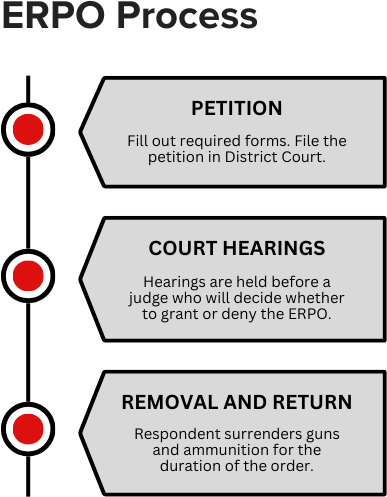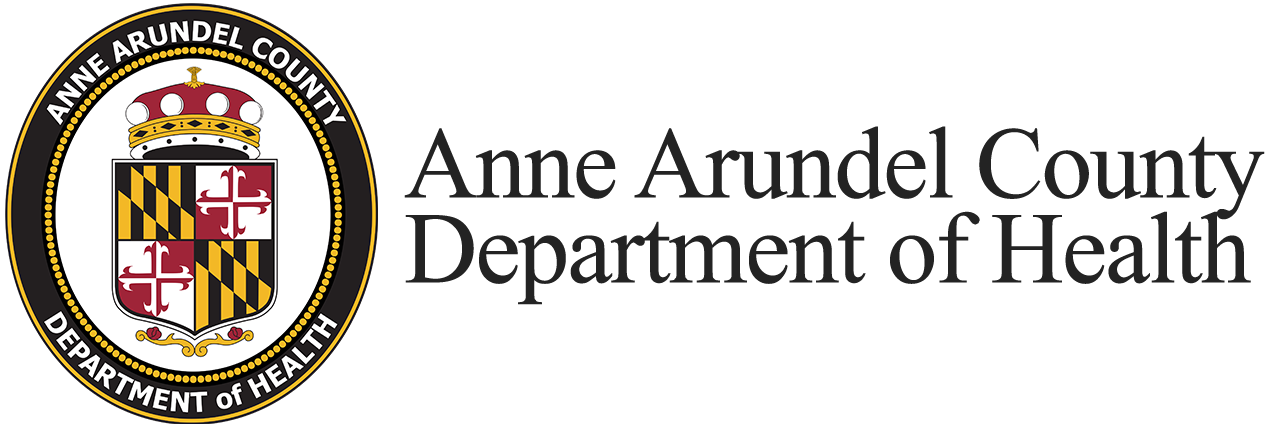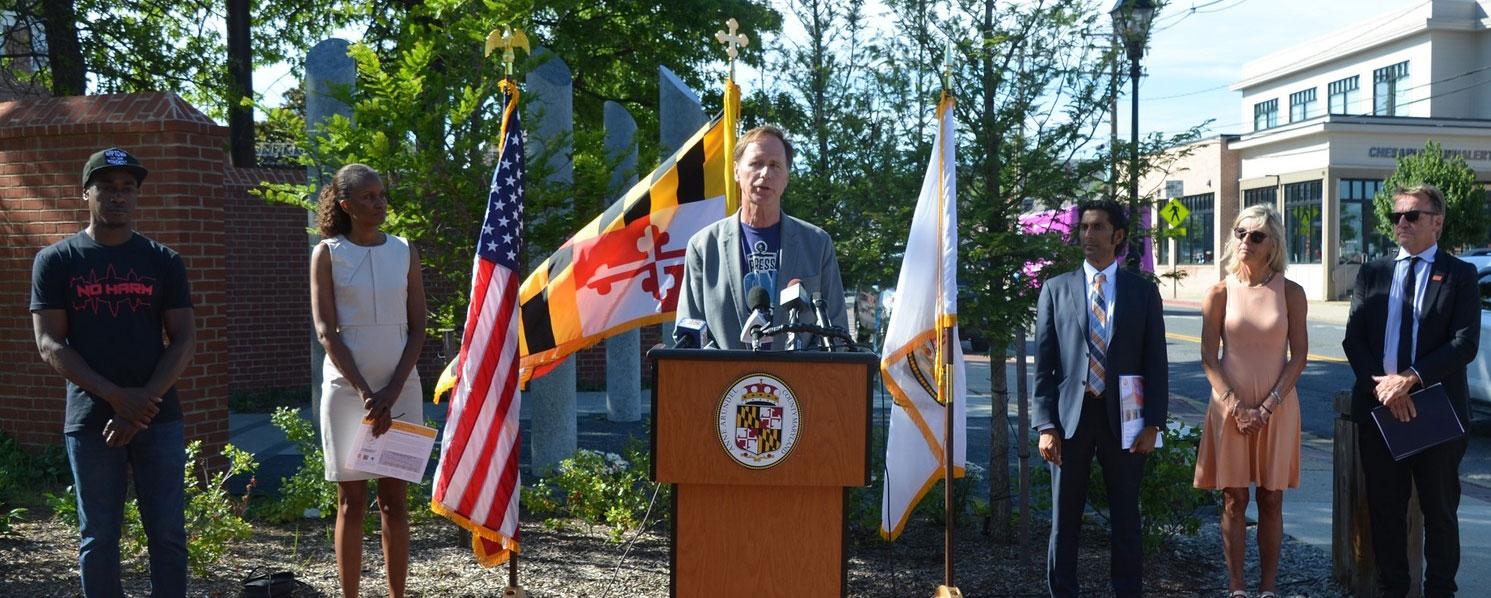ERPOs in Anne Arundel County
ERPOs became available in Maryland in October of 2018. Since then, they’ve had a steady uptake in most counties. Anne Arundel County were very early adopters of ERPOs and trained dedicated staff from crisis response, law enforcement and the justice system. As a result of this early buy-in and specially trained staff, the county files more petitions for ERPOs than anywhere else in the state. Since ERPOs became available, county police have applied for more than 400 orders.
As of mid-2023, the county continues to lead the state in the number of ERPOs filed and issued. In 2022, the county was second in the state for the number of ERPO cases filed (119), after Baltimore County (181). In 2022, the county was also second in the state in the number of ERPOs protective orders issued (81), again behind Baltimore County (97). The county's issuance rate is 68%, compared to the statewide average of 52%.
Data on ERPOs in Anne Arundel County comes from the Gun Violence Intervention Team (GVIT) Strategic Plan.
What are Extreme Risk Protective Orders (ERPOs)?
Sometimes referred to as "red flag laws," an ERPO is a court-issued order that temporarily prohibits a person from purchasing and possessing guns and ammunition. ERPOs are civil court orders and therefore do not involve criminal charges.
ERPOs are modeled off of domestic violence protective orders (DVPOs), which temporarily restrict access to guns and ammunition in situations of domestic violence. DVPOs are legal in all 50 states and have been associated with a reduction of domestic violence homicides across the country. As of 2024, ERPOs are legal in 21 states and Washington, D.C.
Both types of protective orders seek to temporarily remove access to lethal means from someone at risk of committing violence against themselves or another. ERPOs are different in that they are not limited to intimate partners and focus on access to firearms.
| What an ERPO Isn't | What an ERPO Is |
| A permanent removal of personal guns and ammunition. | A temporary intervention to help a person in crisis with access to weapons. |
| Issued without due process protections. | Court-issued after evidence of imminent danger is provided. |
Why would someone file an ERPO?
ERPOs are a way to prevent gun violence. When someone is behaving dangerously and at risk of causing personal injury to themselves or others by possessing a firearm, an ERPO may be used to temporarily restrict their access to guns.
- Suicide: In Maryland, guns are the most common means of suicide. ERPOs are a way for individuals to separate a loved one at-risk for suicide from lethal means. Research suggests that for every 10-20 guns removed temporarily through an ERPO, one suicide is prevented. In Anne Arundel County, suicides make up two-thirds of all gun deaths. Suicides continue to be a leading cause of death for Anne Arundel County and guns are the most common means.
- Domestic Violence: Nearly one in four women and one in seven men will experience violence at the hands of their intimate partner in their lifetime. In 2021 alone, 58 Marylanders lost their lives to domestic violence. ERPOs are a way for victims of domestic violence to protect themselves and their families from gun violence by an abusive partner.
Who can file for an ERPO?
Respondents: The subject of an ERPO. An ERPO is filed to temporarily prohibit a respondent from purchasing and possessing guns because there is clear, convincing and imminent evidence that the respondent is at risk of causing personal injury to themselves or someone else.
Petitioner: Individuals who request an ERPO. In Maryland, petitioners can include any of the following individuals:
- Spouse of the respondent
- Cohabitant of the respondent
- Relative by blood, marriage or adoption
- Person with child(ren) in common
- Current dating or intimate partner of the respondent
- Law enforcement officer
- Medical professional who has examined the respondent
In Anne Arundel County, most ERPOs are filed by a police detective. Medical professionals who can petition include a physician, psychologist, clinical social worker, licensed clinical professional counselor, clinical nurse specialist in psychiatric and mental health nursing, psychiatric nurse practitioner, licensed clinical marriage or family therapist, or health officer or designee of a health officer who has examined the individual.
If an individual believes they may harm themselves or others, that person can also voluntarily surrender guns temporarily to police, a friend or family member who is not otherwise prohibited or to a gun retailer participating in Maryland's Gun Shop Project. Find out more by visiting the Responsible Gun Ownership Toolkit.
What is the process to file an ERPO?
Not sure where to start? Call your county district office to talk to a police detective for more information or for help with the petitioning process:
| District | Phone Number |
| Northern District | 410-222-6135 |
| Southern District | 410-222-1961 |
| Eastern District | 410-222-6145 |
| Western District | 410-222-6155 |

Petition Process
An eligible individual must petition for an ERPO to begin the process.
- Respondents: The subject of an ERPO. An ERPO temporarily prohibits a respondent from purchasing and possessing guns because the respondent is behaving dangerously.
- Petitioner: Individuals who request an ERPO. In Maryland, petitioners include law enforcement, certain health or mental health professionals, family members and intimate partners of the respondent.
The petitioner must complete an ERPO Petition, which includes forms DC-ERPO-001 and addendum forms DC-ERPO-001A which asks for a description of the respondent and DC-ERPO-001B which asks for a summary of the respondent's behavior and mental health history. If an order needs to be modified, rescinded or extended, form CC-DC-ERPO-006 is required.
Court Issue Process
After an eligible individual files a petition, the court will approve or reject the petition.
- Interim ERPO: This type of order happens when a petitioner requests an ERPO when outside of court business hours and is issued until a court hearing can be held.
- Temporary ERPO: This type of order is evaluated by a judge after a hearing and requires evidence that there are "reasonable grounds" that an individual is at risk of immediate harm to themselves or others.
- Final ERPO: After a hearing, a judge can issue a final ERPO if there is “clear and convincing" evidence that an individual is a danger to themselves or others.
Return Process
At the end of a temporary or final ERPO, and if the respondent is not otherwise prohibited from owning or purchasing a gun, law enforcement must return all recovered guns and ammunition.
How long do ERPOs last?
The length of an ERPO depends on the type of order issued after a petition is filed. When an order is issued, the respondent must immediately dispossess themselves of all guns and ammunition to law enforcement. After the order expires and if the respondent is not otherwise prohibited from possessing firearms, law enforcement will return all guns and ammunition.
- Interim ERPO: Court commissioners may issue an interim ERPO that last only until the court is open and a temporary ERPO hearing is held.
- Temporary ERPO: A temporary order is usually in effect for 7 days, or until a full order hearing takes place.
- Final ERPOs: A final ERPO is in effect up to 1 year but can be extended up to six months.
Extreme Risk Protective Orders (ERPOs) Video
On June 3, 2021, Shannon Frattaroli, Ph.D., presented on Extreme Risk Protective Orders (ERPOs) as part of the GVIT's National Gun Violence Awareness Day events. We want to hear your thoughts about this important topic.
Shannon Frattaroli, Ph.D., is an Associate Professor of Health Policy and Management at the Johns Hopkins University Bloomberg School of Public Health, the Director of the Center for Injury Research and Policy, and a core faculty member in the Center for Gun Violence Prevention and Policy. Her research interests include gun violence prevention, domestic violence prevention, and safe systems design.
"[ERPOs are] a policy idea that's really taken off and from our perspective has great potential in solving some of our gun violence issues in our communities."
Shannon Frattaroli, PhD - Johns Hopkins University
Stay Informed
Get notified on upcoming engagements and the latest project related news.

